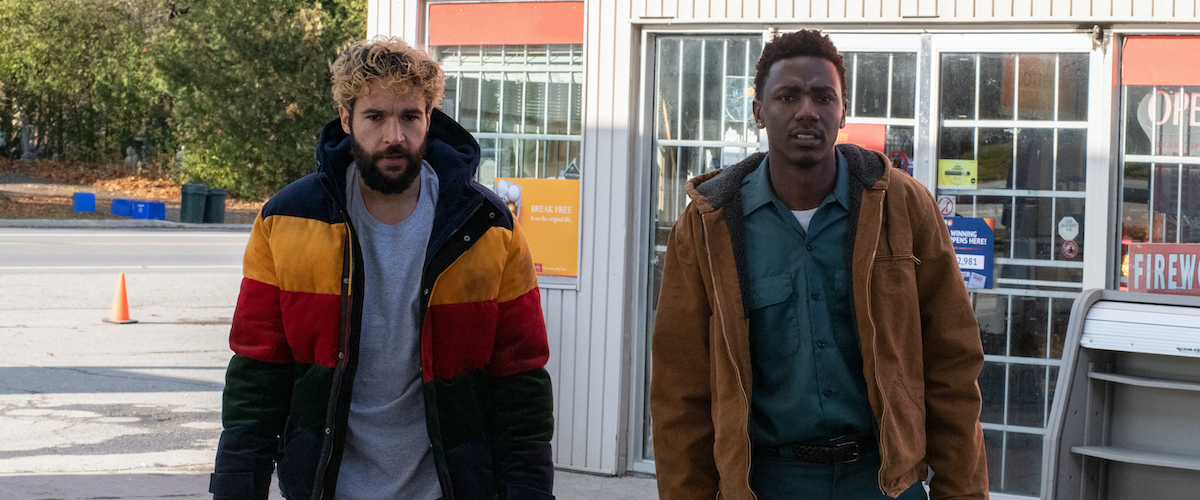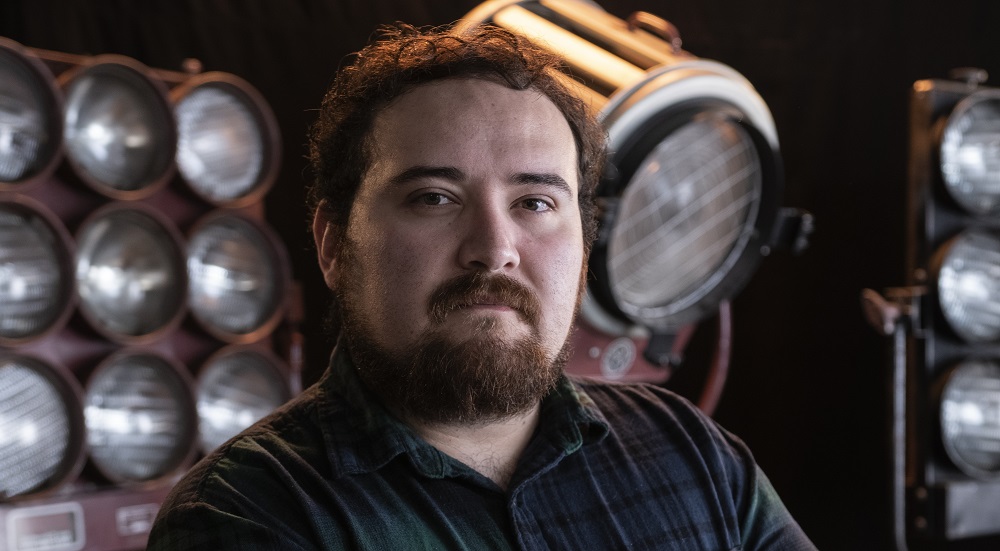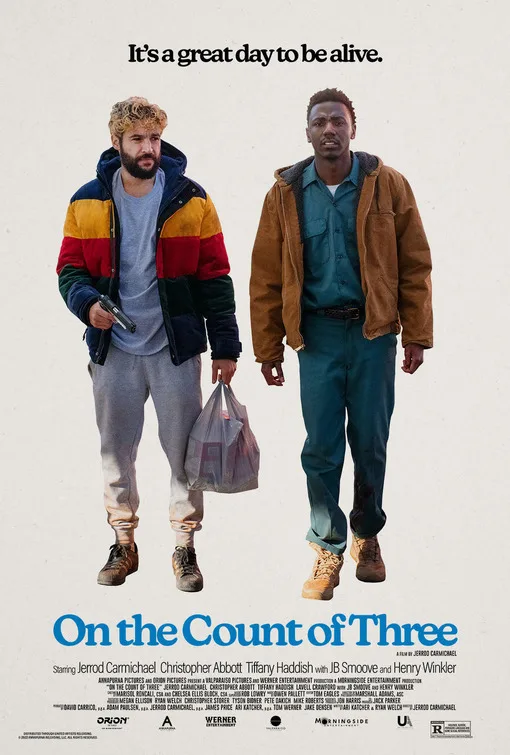“On the Count of Three” opens on the dejected eyes of Kevin (Christopher Abbott), a thirty-something who is pointing a gun at his best friend Val (Jerrod Carmichael), who in turn also aims a lethal weapon back at him. Even though the film will get increasingly out of control, that initial shot of Kevin’s despondent gaze, voicelessly expressing his emotional exhaustion, lingers as its most essential.
This tense prologue isn’t the climax of a confrontation between two men. They have agreed to shoot one another in the head, to commit suicide in tandem, abandoning this world at once. A last-second change of heart ruins Val’s impromptu plan one early morning outside of a strip club. Kevin’s hesitation to shoot, an act of selfless love of which he is capable even if trapped in his own self-destruction, may have given his brother in hopelessness a second chance. Val agrees to “enjoy” one more day before calling it quits on life.
Convinced these are their final hours above ground, the two begin a road trip headed toward the end, a conclusion seemingly of their own volition but derived from haunting trauma, with multiple spontaneous stops to obtain retribution from those they deem responsible for their pain. Overflowing with a chaotic truthfulness about the human condition’s bleakest shadows, the film finds pitch-dark hilarity in the absurd realizations they have after making this pact. Carmichael directs for the first time in a double-duty showcase expanding our perception of his talent.
There’s a morbid gleefulness to Kevin’s outlook early in the ordeal. His demeanor reflects a sense of liberation obtained from believing his suffering is nearly over. He won’t have to return to the mental institution where they couldn’t help him anyway. Sundance Award-winning writers Ari Katcher and Ryan Welch present Kevin as someone with decades of psychological torment, which puts Val’s afflictions—a rocky romantic relationship and a job he despises—into perspective. And yet, though we understand that their reasonings for wanting to die aren’t comparable, their desperation is the same. And they both gravitate to a violent “solution.” The portrayal of these subtleties is at the core of how “On the Count of Three” discusses men’s mental health in a manner that feels rich and true.
For example, Kevin’s bright hair highlights and colorfully disheveled clothing place him as someone holding on to his rebellious adolescence. That he casually pulls out his iPod Nano, an artifact that immediately dates him, speaks of an arrested maturity. Even more so that he chooses to play Papa Roach’s “Last Resort” as an on-the-nose anthem matching the state of his psyche. Kevin is the picture of white millennial anxiety forever stuck in the early 2000s, but also a guilt-ridden liberal hyper-aware of how his actions or the things he says can be interpreted based on his privilege.
All of those elements come alive in Abbott’s ostentatious interpretation of the conflicted individual, a mentally embattled person with a righteous chip on his shoulder given the unfairness of his childhood, but who isn’t entirely unsympathetic to those around him. Alongside his title role in “James White,” another independent feature where a young man battles inner turbulence of a different type, this stands as one of Abbott’s most remarkable performances, rendered so indelible in its erratic kookiness and outburst of guarded earnestness because it plays opposite Carmichael’s more restrained unraveling.
“It’s like your sad looking eyes got purpose all of a sudden,” Val tells Kevin while on an elevator ascending to what the latter hopes will be a fateful reckoning for a major villain from his past. Later, Val meets with a quarrelsome figure of his own: his girlfriend, and future mother of his child, Nat (played by a marvelously stern Tiffany Haddish).
Throughout this ghastly adventure, Katcher and Welch take time to mine levity from Kevin’s ironic self-awareness about his hypocritical stance on gun control as he holds a firearm with intention to deploy it, his insufficient determination to talk about race with Val, and the many instances in which Val must rein in their “joy ride” to hell. As bizarre as the tone should land on paper, “On the Count of Three” repeatedly features chuckle-worthy, if not sidesplitting moments.
Interwoven with the profanity-ridden banter that centers Val’s annoyance with Kevin’s behavior, which could lead us to think their relationship stays on the surface, there are profoundly touching exchanges that demonstrate otherwise. For example, halfway through their deadly escapade, Kevin thanks Val for always trying to uplift him. His counterpart responds with the suggestion that where they find themselves means his efforts were in vain. Those droplets of sorrowful lucidness help the film transcend the realm of mere provocation.
Captured on celluloid, there’s a richness to the hues on screen, whether the pink façade of the nightlife establishment where the duo almost perished is paired with the drab natural palette of the New Jersey winter or contrasts between the co-lead’s outward appearances. One could say that cinematographer Marshall Adams, with a career mostly on television, capitalized on the opportunity to shoot a project with great kinetic force on 35mm. A nighttime chase set to an evocative score testifies to Carmichael’s ability to make a vivid, aesthetically memorable directorial debut.
Ultimately, any movie about suicide walks on inherently treacherous terrain, and one’s appreciation for “On the Count of Three” will hinge on every viewer’s comfort zone or personal triggers to engage with a production that, while not disrespectful or blasé about mental health struggles, does take a singular approach that some may perceive as insensitive. Yet, contrary to what some could infer from the outcome of this narrative, I don’t believe the filmmakers glorify the pair’s revenge fantasy, nor do they use the fact that Val is going to become a father as a magic bullet to solve the emptiness that plagues him. There are no promises of that, but rather the knowledge that he now must consider whether he wants to be a permanent scar on another being.
Sometimes despair tricks us into believing that ceasing to exist offers instant peace from the turmoil inside one’s mind. To admit that there’s comfort in the possibility of not waking up again because incessant gloom torture us remains taboo. Some nights feel like they could be the last one and some mornings like a penance one must continue to endure. Undoubtedly, these fatalistic sentiments, products of chemical imbalances or a myriad of reasons depending on what we’ve each faced on our trails, are challenging to share with others. Even to speak these feelings out loud can be terrifying. “On the Count of Three” refrains from moralistic judgements or absolute answers, and instead wrestles in a tumultuous manner with the awfulness of these experiences that not everyone survives.
Perhaps if we accept that our worst inclinations don’t define us or illustrate all that we are, we might have compassion for what takes a toll on others. Maybe we would even have some clarity to stride ahead, to find other avenues of peace. Carmichael’s film understands this.
“On the Count of Three” is a rousing tragicomedy that straddles a line between incredibly calibrated gallows humor and a devastating discourse on the burden of existence. Throughout the wild ride, I was always drawn back to Kevin’s pleading stare, not feeling pity, but with the kind of empathy one can only truly have for someone who reminds you of yourself.
Now playing in theaters.




















